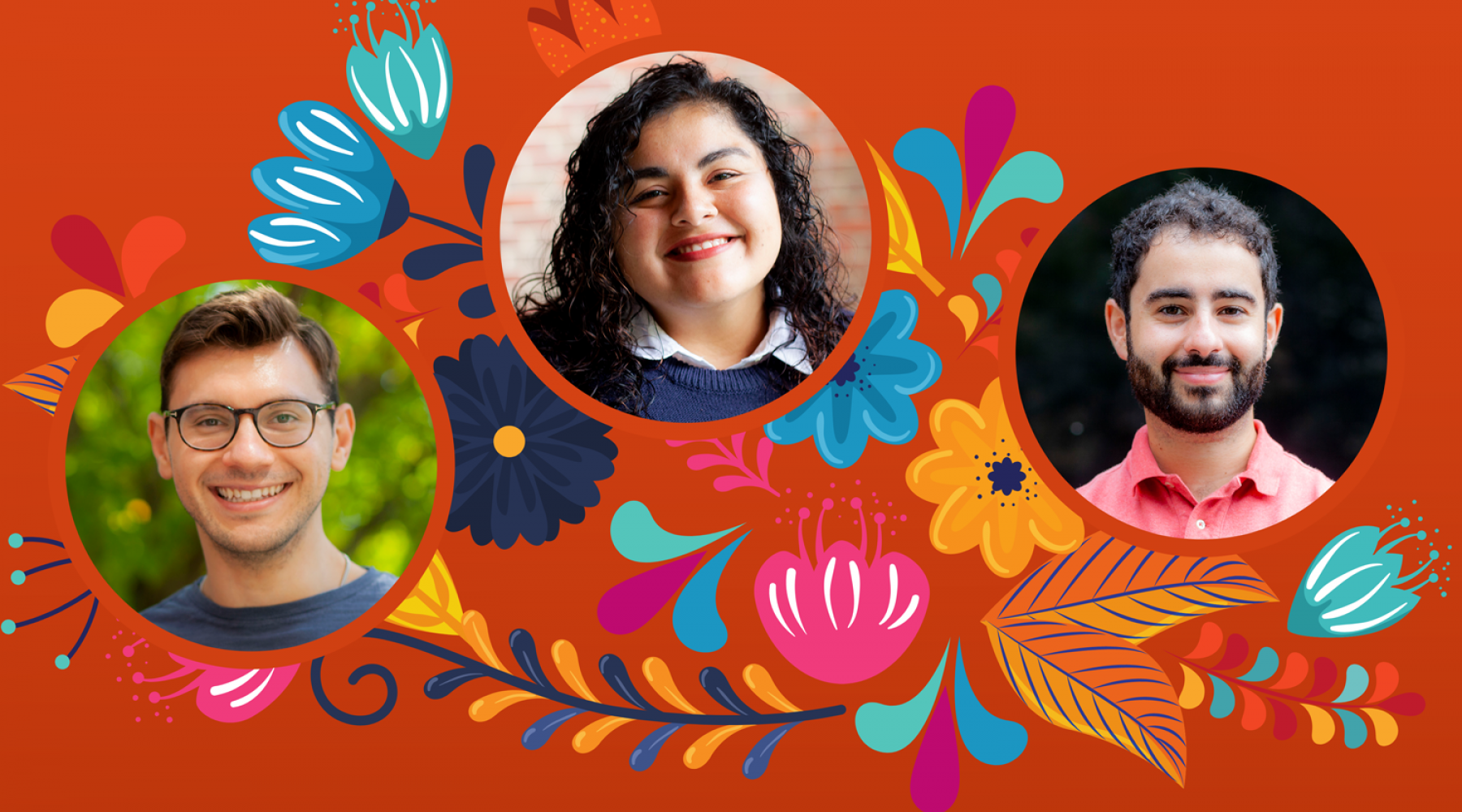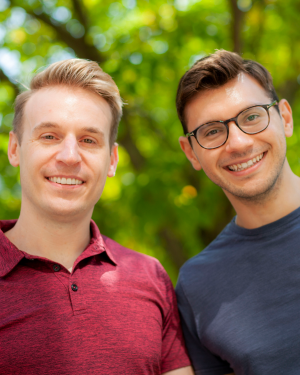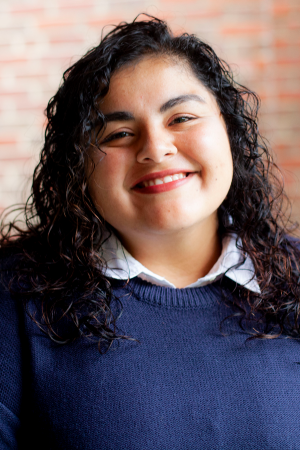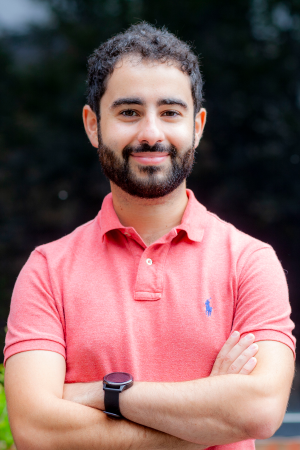
Members of the Tuck community reflect on their goals, accomplishments, inspirations, and passions in honor of Hispanic and Latinx Heritage Month.

One of the accomplishments I’m most proud of is earning my Eagle Scout. I don’t consider myself “outdoorsy” and becoming an Eagle Scout posed some challenges (you try managing a group of 20+ teenage boys in your first leadership experience). But the twelve points of the Scout Law, which I recited almost weekly for five years, have been internalized as values and will stay with me for a lifetime. Trustworthy. Loyal. Helpful. Friendly. Courteous. Kind. Obedient. Cheerful. Thrifty. Brave. Clean. Reverent.
My freshman comp professor liked to start class by showing eye-catching images to stimulate discussion. One day, she projected an image of a child, arms wrapped around the scarred belly of a pregnant woman. The class launched into interpretation, debating social commentary on abortion or plastic surgery.
One of my classmates raised his hand and posited that the photo’s subject may have escaped from an abusive partner. He, himself, was out on parole after killing a policeman while driving under the influence. “No one has ever said that in all the years I’ve taught this course,” the professor remarked. This nontraditional student added immensely to the richness of our class discussion. This was my first lesson in reframing away from affirmative action and towards DEI.
To me, DEI is all about representation. Throughout history, certain societies have made significant progress regarding the inclusion of marginalized groups—before ultimately backsliding. Other societies have achieved the same level of progress and sustained it. What’s the difference? In the latter examples, individuals from those marginalized groups reached the highest levels of influence in those societies; they were leaders in politics, academia, and commerce.
Once adequate levels of representation are achieved at the top of a social hierarchy, it’s a Sisyphean task to reverse progressive policy because the policymakers have personal buy-in. This is important because DEI is an excellent barometer for the overall health of society.
I believe it was Betty Friedan who, when questioned about specific policies employers could put in place to make the workplace good for women, articulated that you don’t need policies that are good for women. You just need good policies in the workplace and women will feel comfortable. In a similar but more contemporary example, Emma Watson has explained how gender equality is a male issue too. Policy that improves inclusion isn’t just better for marginalized groups—it’s better for everyone.
I’m currently reading The Man Who Mistook His Wife for a Hat. The book is an anthology of clinical tales by neurologist Oliver Sacks. Superficially, it’s a series of essays describing the lives of patients afflicted by various neurological pathologies. Philosophically, the book is about people who see the world differently—some of whom don’t seem to be suffering from “disorders,” so much as they are blessed by “orders.”
Jack originally hails from Texas and spent his career before Tuck working in healthcare strategy. He is passionate about all things digital health and is most excited about the innovation programs at the Magnuson Center. Jack moved to New Hampshire with his partner, Alex, and their dog, Rommie. Since arriving in August, his favorite part of Upper Valley life has been the cider.

I admire my mother the most; she is the strongest, most loving, and most resilient person I know. My mother didn’t let our socioeconomic background determine my aspirations and taught me how to be resourceful, honest, empathic, perseverant, and self-aware. She did everything she could to ensure my brother and I had the right to dream, and the discipline to turn our dreams into a reality.
My life philosophy is that success is an everyday construction and is not affected by short-term outcomes. If something goes wrong, but I know I am doing my best, I reflect, adjust, and keep working. Success is a continuous effort, and it is subjective.
For me, success is multi-dimensional. It means family time, being passionate about my professional development, getting out of my comfort zone, and having a positive impact on my community.
I recently read Finding Me: A Memoir by Viola Davis and recommend it to everyone.
Jennifer Chacon Salas T’24 grew up in Costa Rica and graduated from the University of Costa Rica. Before starting at Tuck, she worked in internal consulting and compliance at SmileDirectClub. At Tuck, she was designated as a Forte Fellow, joined the Consulting Club and Low Income & First-generation at Tuck (LIFT), and is working on a community consulting project.

I find it awesome that the most physically active stage of my life has been my time at Tuck. I am running daily and finding numerous opportunities to kayak, hike, ski, skate, snowshoe, and play hockey. This has been a blessed counterweight to the fact that my time at Tuck also marks the most social stage of my life and the stage of my life with the best access to incredible ice cream and Portuguese muffins.
By the time you read this, I will have joined the “Tuck Over 30” club; there is a good chance that this will add more lower-impact activities to my routine.
I took a two-semester leave of absence during college because I wanted additional opportunities to experiment with careers before graduating. The two experiences that I ended up pursuing interacted with each other in my mind in interesting ways; I wonder how my life would be different had I secured only one, or neither, of these roles.
My time in the White House confirmed my passion for public service–and I thought at the time that this was proof that I was destined to work in government à la Sam Seaborn from The West Wing (even though I am undoubtedly a Toby at heart). But my work at the Aspen Institute helped me understand that I was just as fulfilled working on social impact more generally, which helped me think more expansively about possible careers. This also helped bring the idea of pursuing an MBA into play for me.
CREST is always my starting word for Wordle. It will probably remain so even after the glorious day when it is the solution to the puzzle.
At the risk of momentarily sounding like a not-Tuck Nice MBA, I think a core of my worldview can be described as “focus on creating value.” However, given that a very similar point was made by the decidedly Tuck Nice faculty member Professor Anant Sundaram in the closing of his must-take elective Corporate Valuation, I hope you give me a shot here.
Economic value matters in the professional sphere–creating something that people are willing to pay money for is a decent indicator that one’s work addresses some unmet need–but in the (hopefully larger) personal sphere, there are also infinitely many equally (if not more) valid needs for friendship, love, and the like out there that also ought to be met. In the same vein of “if a tree falls in the woods…” if one’s action never contributes to helping anyone else, did that action matter? Was the underlying effort worthwhile?
If you did not understand my earlier West Wing reference, that show is a must. And if you can only watch one episode, S1E10 is a masterful tear-jerker.
In terms of content I recently encountered, The Racial Equity Institute has a pamphlet called “The Groundwater Approach: Building a practical understanding of structural racism.” I think it is an excellent distillation of the arguments in favor of viewing social challenges through race- and systems-conscious lenses.
Andrew Key is from the Washington DC metro area (Maryland side!) and is a graduate of Cornell University’s School of Industrial and Labor Relations. He worked in social impact and consulting separately before pursuing his MBA. Thanks to Tuck, Andrew was able to combine these interest areas and intern as a social impact consultant at The Bridgespan Group. He serves in leadership roles for multiple DEI-focused initiatives at Tuck including the Tuck Diversity Conference, Low Income & First-generation at Tuck, and Consortium. He is also a Business, Government & Society Fellow and a Non-profit Board Fellow.
Many Voices, One Tuck (MVOT) celebrates the stories of our vibrant and diverse community. What’s your story? Email DEI at Tuck if you’d like to contribute to the MVOT project.
Note: MVOT is open to members of the Tuck community, including students, alumni, faculty, staff, TEE and Tuck Bridge participants, and MHCDS graduates.